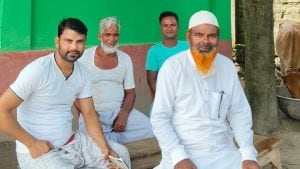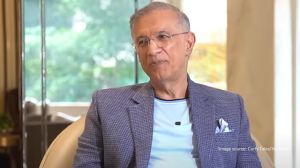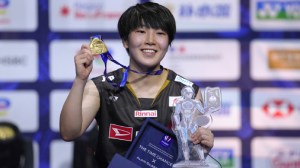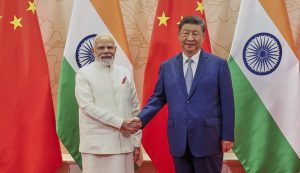Magsaysay for Indian NGO working to educate girls who drop out of school
Educate Girls has made history as the first Indian organisation to receive the award, a statement from the Ramon Magsaysay Award Foundation (RMAF) said in Manila.
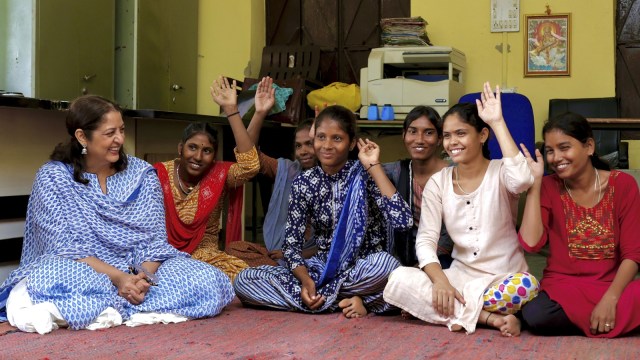 Safeena Husain (left), the founder of Foundation to Educate Girls Globally, with a group in Rajasthan. (AP/File)
Safeena Husain (left), the founder of Foundation to Educate Girls Globally, with a group in Rajasthan. (AP/File)The Foundation to Educate Girls Globally, widely known as Educate Girls, an Indian non-profit working to bring out-of-school girls into classrooms, is among the 2025 Ramon Magsaysay awardees announced on Sunday.
Educate Girls has made history as the first Indian organisation to receive the award, a statement from the Ramon Magsaysay Award Foundation (RMAF) said in Manila. It has been named for “its commitment to addressing cultural stereotyping through the education of girls and young women, liberating them from the bondage of illiteracy and infusing them with skills, courage and agency to achieve their full human potential,” it said.
Starting with just two villages in Rajasthan in 2007, the organisation has expanded to over 30,000 villages across India, impacting the lives of more than two million girls over nearly two decades. But at the heart of this remarkable journey is a dream once held by a young girl who herself had dropped out of school due to personal hardship — Safeena Husain, the founder and board member of Educate Girls. Her return to education, and eventual graduation from the prestigious London School of Economics (LSE), was made possible by a timely push and encouragement — a turning point that shaped her life’s mission and inspired a movement to ensure no girl is left behind.
Husain said she experienced first-hand the stigma faced by girls who are denied education. “I was told things like ‘what will she do in life?’ or that I should just be married off,” she recalled.
A woman family friend helped her return to education, eventually leading Husain to graduate from LSE. After working briefly in Silicon Valley and with various non-profits, Husain returned to India to address the gender gap in education. She founded Educate Girls with the goal of not just enrolling girls into schools, but also ensuring retention and learning outcomes.
Since its beginning, the organisation has been working closely with governments at state as well as national level. “Governments too have the same mission, to bring back out-of-school-girls to mainstream education. When goals are aligned, cooperation ensures faster progress,” said Husain.
Educate Girls began with two villages in Rajasthan — Pali and Jalore — based on a list obtained from the then Ministry of Human Resource and Development (MHRD) with the names of districts having a considerable gender gap in terms of education.
According to Husain, the change cannot be brought by an outsider preaching to send girls to schools, but by involving local support. Central to the initiative’s success is the concept of Team Balika, a model developed by her with local volunteers, both men and women, who act as gender champions in their communities. “This army of volunteers is not working for money but for change. Their community connection makes them powerful agents of transformation,” said Husain.
Educate Girls has also been at the forefront of innovation in the non-profit sector. It pioneered the Development Impact Bond (DIB) in education – India’s first – where funding is linked to measurable results. This data-driven approach has allowed the organisation to track impact and refine strategies in real time. One of its recent advancements is the development of an Artificial Intelligence model that helps identify “hotspots” — areas with a high concentration of out-of-school girls. This allows targeted interventions and efficient resource allocation.
Despite its success, Husain emphasised that social attitudes remain a significant barrier. “Poverty is one part of the problem, but patriarchy is a much deeper challenge. Changing mindsets requires community participation,” she said, recalling an incident where local resistance to girls’ education was countered by a local volunteer, changing the tone of the conversation.
Looking ahead, Educate Girls aims to reach 10 million learners globally, seeking partnerships with like-minded organisations worldwide to scale their impact. “If India wakes up tomorrow believing that all boys and girls are equal, we won’t need Educate Girls. Until then, the organisation continues to fight for every girl’s right to learn and thrive,” said Hussain.
The other two winners of the Ramon Magsaysay awards — considered the Asian equivalent of the Nobel Prize — this year are Shaahina Ali from the Maldives for her environmental work and Flaviano Antonio L Villanueva from the Philippines. The RMAF said Ali was being recognised for “her unwavering commitment to protecting the marine ecosystem of the Maldives with passion, vision and inclusivity, ensuring that her work will be carried on by another generation of Maldivians in search of effective local solutions to global problems.” Villanueva, a priest, is being recognised for “his lifelong mission to uphold the dignity of the poor and the oppressed, daily proving with unwavering faith that by serving the least of their brethren, all are restored,” it said.
-With PTI inputs



